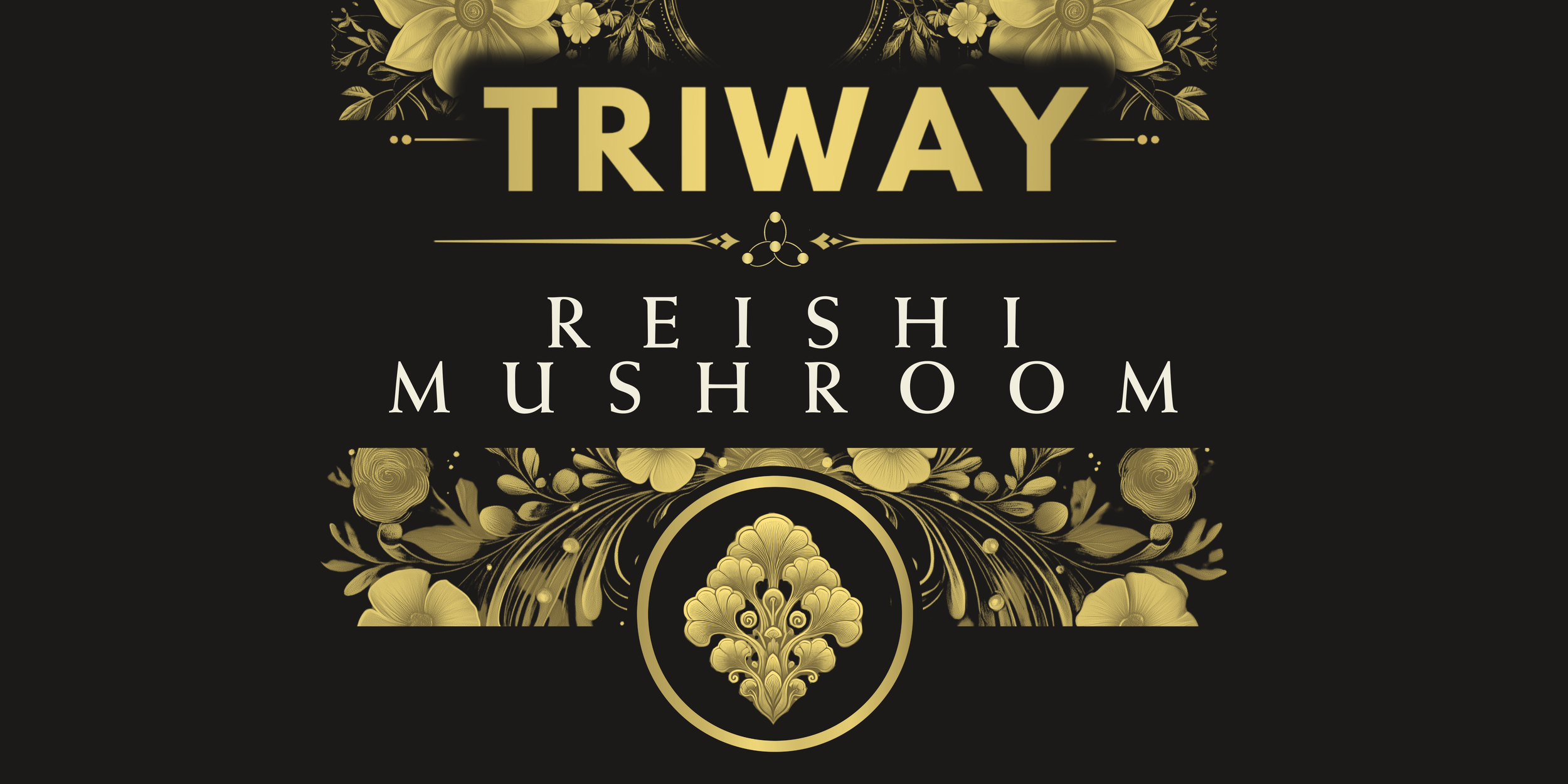Reishi Mushroom (Ganoderma lucidum): A Key Adaptogen for Holistic Wellness
1. Introduction
Reishi mushroom (Ganoderma lucidum), often referred to as the “Mushroom of Immortality”, has been valued in various traditional medicine systems for over 2,000 years. Historically used in Traditional Chinese Medicine (TCM), Japanese, and Ayurvedic practices, it has been studied for its potential role in immune function, stress adaptation, and overall well-being.
At TriWay, we integrate Reishi mushroom into our Triángulo de la Salud framework, which promotes physical, mental, and social balance. While research on Reishi has provided promising insights, further scientific validation is required in some areas, and individuals should be aware of potential interactions with medications.
This article explores:
- The historical use and cultural significance of Reishi.
- Scientific research associated with its bioactive compounds.
- How Reishi aligns with the TriWay wellness approach.
2. History and Traditional Uses of Reishi
Reishi has been referenced in Chinese, Japanese, and Korean medical texts for centuries. In Traditional Chinese Medicine (TCM), it is known as Lingzhi (灵芝) and is associated with promoting balance and vitality.
Cultural Uses:
- China: Historically used by emperors and scholars for well-being and longevity.
- Japan: Known as Mannentake (“10,000-year mushroom”), used to support endurance and resilience.
- Ayurvedic Traditions: Incorporated for its association with relaxation and wellness.
These traditions highlight Reishi’s long-standing role in natural health practices.
3. Bioactive Compounds and Mechanisms of Action
Reishi contains various bioactive compounds that have been the focus of modern research.
Key Compounds:
- Polysaccharides & Beta-Glucans: Studied for their potential role in supporting immune function.
- Triterpenes (Ganoderic Acids): Researched for their antioxidant properties and role in cellular balance.
- Phenolic Compounds: Investigated for their association with oxidative stress regulation.
Potential Mechanisms of Action:
- Immune System Modulation: Research suggests Reishi may influence the body’s natural immune response.
- Stress Adaptation: Some studies indicate it may play a role in supporting stress resilience.
- Cellular and Antioxidant Support: Examined for its effects on cellular health and balance.
4. Scientific Research on Reishi
Reishi has been examined in various studies, though further human trials are needed to validate its full potential.
1. Immune Function
- Research suggests that polysaccharides in Reishi may support the body’s natural defense mechanisms. (Wasser, 2011)
2. Stress and Relaxation
- Some studies have explored Reishi’s potential to support stress management by modulating cortisol levels. (Patel & Goyal, 2012)
3. Cognitive Function
- Research indicates possible associations between Reishi and cognitive health, including relaxation and focus. (Chen et al., 2006)
4. Cardiovascular and Metabolic Balance
- Some findings suggest Reishi may support vascular function and metabolic regulation. (Lin & Zhang, 2004)
While these studies provide valuable insights, further clinical research is necessary to confirm Reishi’s long-term effects and optimal applications.
5. Dosage, Safety, and Considerations
Recommended Dosage:
- Standardized Extract: 500–1,500 mg/day (based on individual needs).
- Reishi Tea: 1-2 g of dried mushroom per cup.
- Best Time to Consume: Often recommended in the evening for relaxation support.
Potential Side Effects & Considerations:
- Some individuals may experience dizziness, nausea, dry mouth, or stomach discomfort.
- Long-term use of high doses has been linked to potential liver effects in some cases.
- May interact with blood-thinning medications, affecting clotting function.
- Due to limited research on pregnant and breastfeeding women, use is not recommended.
Synergies with Other Adaptogens:
- Ashwagandha: Studied for its role in stress management.
- Lion’s Mane: Researched for cognitive support.
- Cordyceps: Associated with endurance and oxygen utilization.
6. Reishi and the TriWay Wellness Approach
At TriWay, Reishi is an essential component of our Triángulo de la Salud, supporting:
- Physical Wellness: Associated with immune and metabolic support.
- Mental Well-Being: Explored for its role in relaxation and cognitive function.
- Social Vitality: May contribute to overall balance and resilience.
7. Conclusion
Reishi mushroom remains one of the most researched adaptogens with a long history of use. While studies suggest potential immune, stress-adaptation, and cognitive benefits, more human clinical trials are needed to confirm its effects.
At TriWay, we emphasize science-driven formulations that honor both ancient traditions and modern research. Incorporating Reishi mushroom into a balanced wellness approach may complement overall well-being when used responsibly.
8. References
- MedlinePlus. “Reishi Mushroom (Ganoderma lucidum).” Source
- MSD Manual. “Reishi.” Source
- Wasser, S. P. (2011). "Current findings on medicinal mushrooms." Applied Microbiology and Biotechnology, 89(5), 1323-1332.
- Chen, X., et al. (2006). "Structure-function relationships of triterpenes from Ganoderma lucidum." Current Medicinal Chemistry, 13(6), 629-646.
- Patel, S., & Goyal, A. (2012). "Recent developments in mushrooms as anti-cancer therapeutics." 3 Biotech, 2(1), 1-15.
- Lin, Z. B., & Zhang, H. N. (2004). "Anti-tumor and immunoregulatory activities of Ganoderma lucidum." Acta Pharmacologica Sinica, 25(11), 1387-1395.
